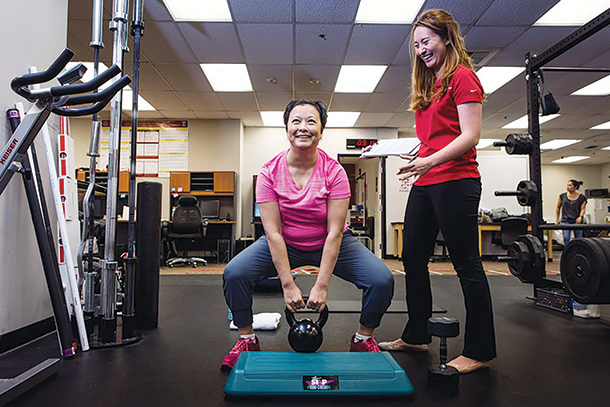Two USC researchers are using exercise and the practice of mindfulness to improve quality of life for cancer survivors.
Mindfulness practice is a type of health education program meant to help patients alleviate suffering due to stress and disease, said David Black, PhD, MPH, assistant professor of preventive medicine at the Keck School of Medicine of USC and founding director of the American Mindfulness Research Association.
Black’s expertise is in helping patients become more active participants in their treatment and healing. Using mindfulness meditation practices, he helps cancer survivors refocus their attention and attitude so they are better equipped to handle challenges arising from living with a disease. People can tap into their ability to gain a sense of peace while still having cancer, he said.
“The healing capacities of the human mind should be utilized more in medicine,” Black said. “Learning to approach disease with an attitude of mindfulness, openness and nonjudgment may help patients adhere to what they’re being asked to do by doctors. Discomfort and fear can make patients not follow recommended treatment, especially if the treatment is making them exhausted and comes with side effects.”
Christina Dieli-Conwright, PhD, assistant professor of research biokinesiology and physical therapy in the USC Division of Biokinesiology and Physical Therapy, and director of the Integrative Center for Oncology Research in Exercise, said her patients tell her they feel mentally healthier, more motivated and less depressed after going through a 16-week exercise program delivered by graduate students in the biokinesiology and physical therapy programs.
“A plethora of studies have looked at the effect of exercise on cancer survivors and found everything from improved quality of life — people feel better, happier and less tired — to improved functional ability because participants become physically stronger,” Dieli-Conwright said.
Both scientists are studying how these alternative techniques can supplement traditional cancer therapy. Cancer survivors not only have better health outcomes but also feel better mentally and emotionally equipped to face the world, the researchers said.
USC is a leader in cancer research and is home to one of the oldest and largest cancer surveillance programs in the world, which is monitored by the Keck School of Medicine and USC Norris Comprehensive Cancer Center. Additionally, the new USC Michelson Center for Convergent Bioscience is dedicated to fast-tracking detection and cures for diseases by enabling researchers from different disciplines to collaborate.
The power of exercise
Exercise reduces metabolic syndrome, which includes factors such as high blood pressure, large waist size and high levels of glucose in blood. Metabolic syndrome predisposes people to heart disease and diabetes. In some cancers such as breast and prostate, the number one cause of mortality is heart disease, just like in the general population, Dieli-Conwright said.
Additionally, obesity does not improve the chances of survival. In fact, obesity can increase the risk of the cancer coming back, she added. Moreover, for some cancers like cancer of the uterus, patients cannot undergo necessary surgery if they are obese. They need to change their diet and increase their exercise regime before doctors can operate on them.
Dieli-Conwright recommends that cancer survivors visit the American Cancer Society or the American Institute for Cancer Research websites for exercise and diet tips. They can also follow the American Cancer Society’s Instagram or Facebook.
They should not turn to the piles of exercise training videos on YouTube, however, because it is difficult to weed out good advice from exercise tips that can get people injured, she said.
Firsthand experience
Joyce Chao dealt with hopelessness and anxiety in 2015 when her doctor told her she had breast cancer. The news was even more harsh because she felt like she needed to be strong for everyone because she was her father’s caregiver. He had stroke.
Before enrolling in Dieli-Conwright’s program, Chao said she “was in a state of whatever” and that “nothing really mattered.”
“My life went from the fast lane to the bicycle lane,” Chao said. “Going through the program allowed me to speak to a physical therapist and helped me realize I was not alone. Now I can see how not having a social support system makes you more insular, and that doesn’t help with healing.”
Though not overweight, Chao still managed to lose about 10 pounds, she said.
“I was lethargic and out of shape,” Chao added. “I couldn’t even reach for something without feeling like I was straining myself. The program got me back into shape plus some. Now I am listening to my body and learning more about the whole physical being.”
Mindfulness tools
Mindfulness is the systematic training and deployment of attention, resulting in greater awareness of the interconnections between our thoughts, emotions and sensations. It has been defined as coming to terms with things as they are such as differentiating physical discomfort from thoughts and feelings that can worsen discomfort. The practice of mindfulness is regarded as a way to relieve unnecessary suffering.
One of Black’s studies found that colorectal cancer patients who practiced a brief mindful body scan (focusing attention on different body parts and relaxing them in succession) during chemotherapy fared better than those who did not. About twice as many patients in the mindfulness group showed a healthy cortisol hormone response to stress from chemotherapy. Abnormal functioning of this hormone predicts decreased survival time for some cancers, Black said.
People who want to practice mindfulness can go online. Mindful USC — also available as an app — offers 15-minute audio-guided body scans and guided meditations. Their website also offers access to online courses and in-person classes. For beginners, Black recommends the app HeadSpace: Guided Meditation. It offers simplified exercises to give people a taste of what mindfulness can do for them.
“People experiencing lasting levels of mental and physical stress due to disease need some kind of daily relief in their lives, and mindfulness may be of use in this way,” Black said.
— Zen Vuong


